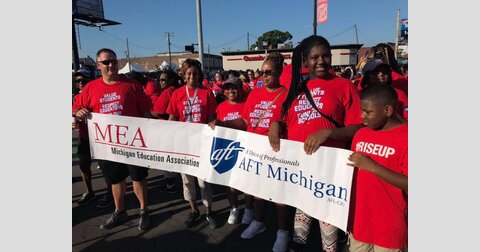Public Schools’ New Critical Race Theory Window Dressing: Social-Emotional Learning
Michigan Department of Education is on board
Progressives in public education establishments nationwide are packaging the tenets of critical race theory into a concept they call social-emotional learning.
In Michigan, teachers unions and Gov. Gretchen Whitmer’s Michigan Department of Education are advancing an effort that incorporates the progressive project of indoctrinating students into accepting claims of institutional racism under the banner of student mental health and wellness.
The Michigan Department of Education has created its own social-emotional learning website stating, “MDE feels Social and Emotional Learning (SEL)” is critical “to support the healthy, safety and wellness of all students.” The site links to an organization that promotes school policies based on a presumption that America’s educational and other institutions are inherently racist.
That organization is the Chicago-based Collaborative for Academic, Social, and Emotional Learning, or CASEL.
Influence Watch, a nonprofit that evaluates organizations, states on its website, “CASEL has come under criticism for using SEL [social-emotional learning] as a means of promoting far-left critical race theory in public schools.”
Many of the social-emotional school programs promoted by CASEL incorporate ideas that school districts can use to advance claims of systemic racism in education. This is because most social-emotional plans include an educational equity component that promotes concepts embedded in critical race theory.
One example is seen in CASEL’s links to a social emotional learning programming in the state of Washington’s public schools.
That state’s social-emotional learning guide mentions the term equity 45 times in 33 pages. One school district in its social-emotional learning document describes equity as, “The distribution of resources that takes into account past history and current position, so that future outcomes are fairly distributed.”
School districts there have implemented curriculums based on claims that institutional racism persists in the state of Washington’s public schools.
One example of a social emotional program CASEL links to is the Shoreline school district in Washington state. That district’s SEL curriculum defines institutional racism as, “Structures, policies, precedents, systems, and formal and informal practices that operate and are manipulated to allow, support, or deprive racial groups a chance to have equal access or opportunity to acquire wealth and social standing in a society. Those with power are dependent, in part, upon the racial groups they deprive to maintain their standing.”
The contentious program is being brought to Michigan by the state’s public school establishment. The Michigan Education Association, the state’s largest teachers union, posted a story on its website on April 7 promoting social-emotional learning. The story focused on Hartland Consolidated Schools, in Livingston County:
“We were taking a stand to support SEL against unwarranted attacks,” said Laura Moore, a parent of students at Hartland Consolidated Schools, said in the MEA story. “We wanted the board and the public to know that SEL allows us to support our students, and we’re literally and figuratively willing to take a stand for it.”
Tulsa Public Schools in Oklahoma is one of many school systems around the country to which CASEL has pitched its SEL program as best practices.
Tulsa Public Schools Superintendent Deborah Gist wrote in a May 2021 blog post, “In fact, school districts, and many public institutions, were not designed to serve students equitably. They were created during moments in history when education was reserved for white people--men specifically--and have matured through many decades when we have not been nearly as intentional and bold as we needed to be to disrupt these oppressive systems and structures.”
Gist continued: “For far too long, we have ignored the unhealthy cultures that are a part of too many organizations and public entities like police departments (and school systems). In fact, American education and American policing have similar historical roots to acknowledge, address and overcome. We have racism (explicit and implicit) in individuals, institutions, and societal structures. If we ignore that and fail to act to change it, we will do so at the detriment not only of people of color but also our society as a whole.”
CASEL also promotes the state of Washington’s approach to social-emotional learning by linking to a policy guide officials there created, “Academic and Student Well-Being Recovery Plan: Planning Guide 2021.” This in turn links to the equity policy adopted by the Shoreline School District, also in Washington.
Another state of Washington school district has a similar equity policy embedded in its SEL curriculum. The Highline Public School district’s policy states:
“Historic decisions and current inequitable practices advantage certain students while disadvantaging others. Students of color; students with disabilities; English language learners; immigrants and refugees; LGBTQ+ students; and Native American and Alaska Native students have all been negatively impacted by the institution of education. Highline students have experienced significant, measurable, system-wide inequities in achievement due to institutional racism and institutional biases, and a failure to address how race; language; disability; socioeconomic status; country of origin; gender; gender identity and sexual orientation; and the intersectionality of those characteristics impact educational outcomes.”
Michigan Capitol Confidential is the news source produced by the Mackinac Center for Public Policy. Michigan Capitol Confidential reports with a free-market news perspective.

